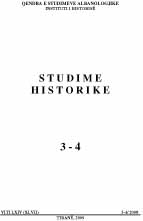Shqipëria në politikën e Austro-Hungarisë në fillim të shek.XX
Albania in the policy of the Austro-Hungary in the beginning of the 20th century
Author(s): Fehari RamadaniSubject(s): History
Published by: Qendra e Studimeve Albanologjike
Keywords: Albania ; Austro-Hungary ; 20th century; Albanian History ;
Summary/Abstract: One of main problems Albanians were facing in the beginning of the 20th century was the lack of education in their own native language. As a consequence, Albanians were ready to accept the assistance and attempts of any Power Nations that was willing to help in this field. The Viennese government while taking advantage of the CultusProtectorate and at the same time securing the sympathy of the Albanian population opened several elementary schools and some secondary ones in Albania. Albanian catholic schools, financed by the Viennese government, were expanded in one big part relatively of the Albanian lands where it stretched first from Tivary, in the north-west, in Peja to Zllokuqan in the north and continuing to Stubëll also Shkup in the north-east, in Tirana, Durrës, in the mid Albania. Within this precinct, a series of schools have operated which contributed greatly for the development of the Albanian language education. The Viennese government not only helped with the schooling and education of the new generation but also, in increasing the level of Albanian national awareness. Austro-Hungarian schools in Albania did serve as a strong base for further development of the national educational system after the declaration of the Independence. Financial assistance, the Viennese government gave for the publication of the school books and also other writings in Albanian language constituted a valuable and big contribution for the development of the Albanian language and literature at that important period.
Journal: Studime Historike
- Issue Year: 2008
- Issue No: 03-04
- Page Range: 039-064
- Page Count: 26
- Language: Albanian
- Content File-PDF

